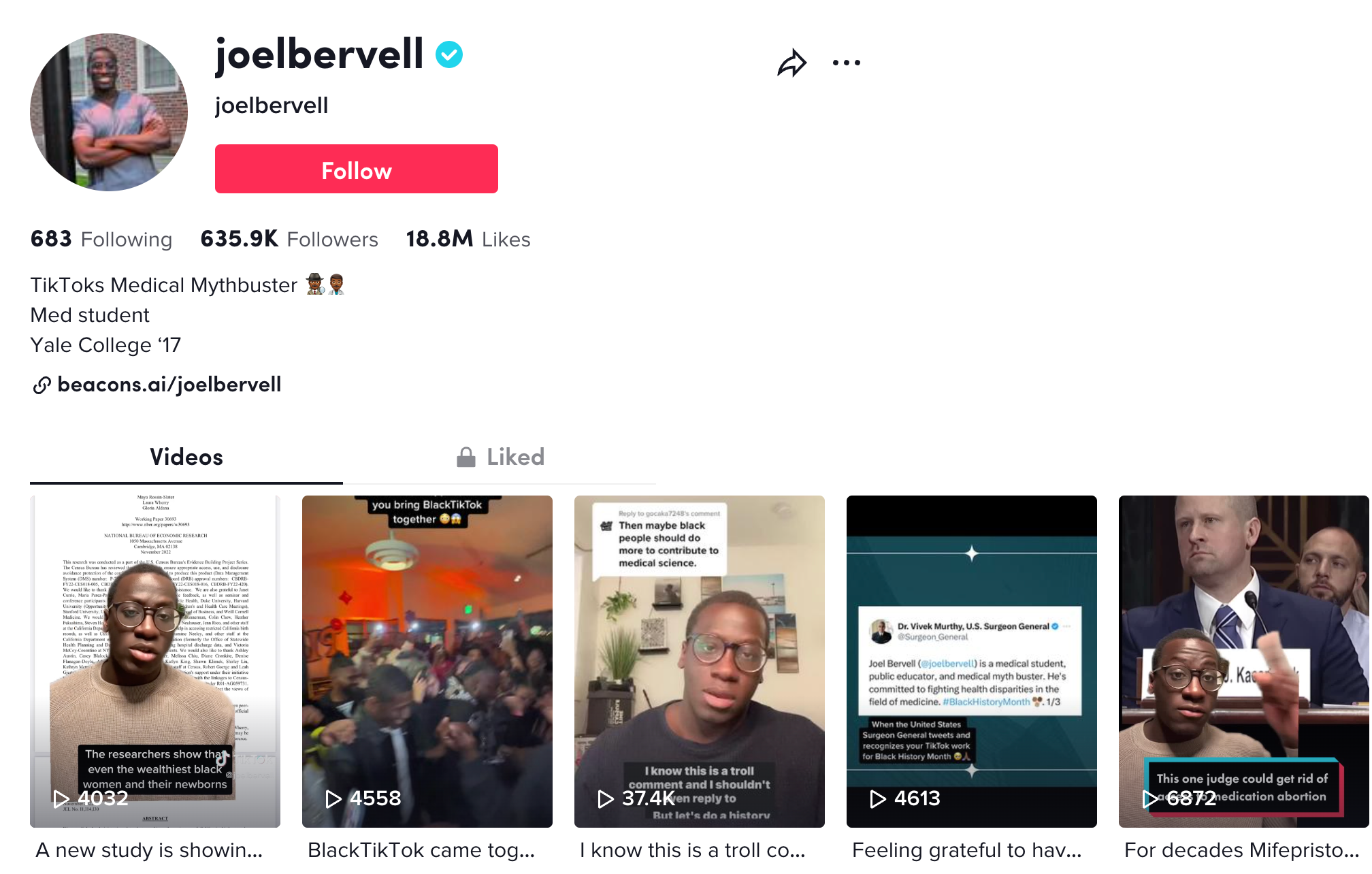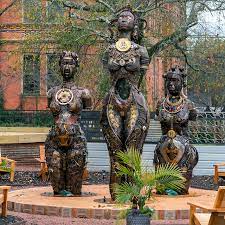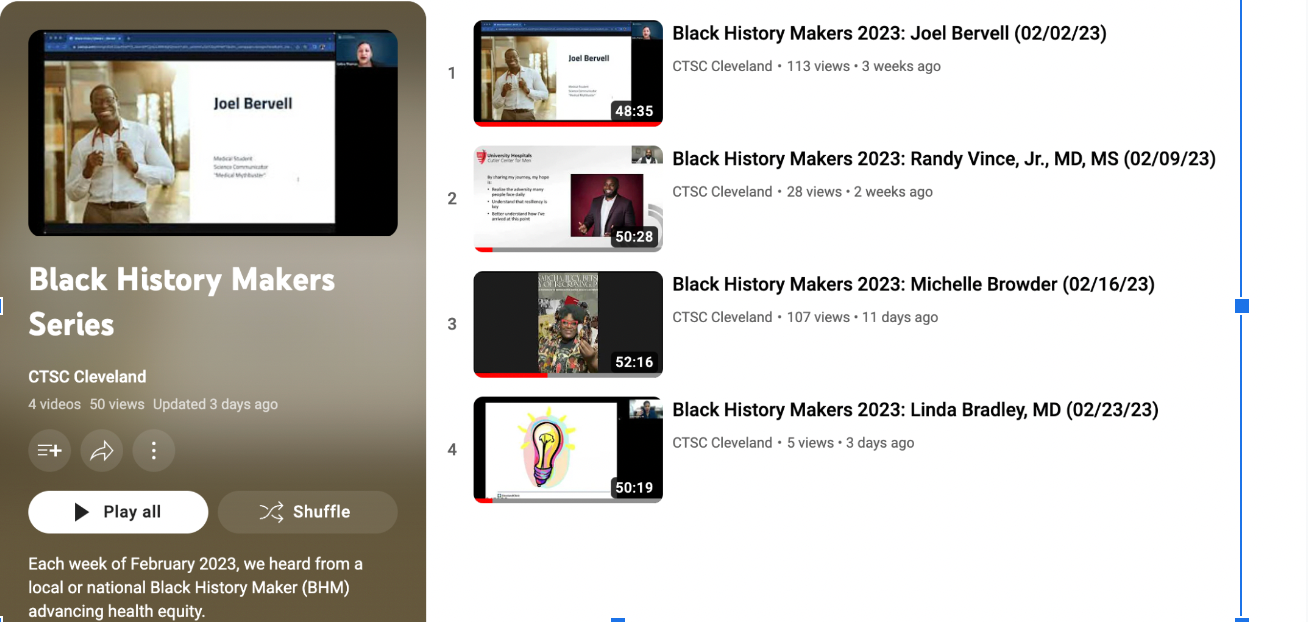Two National and Two Local Black History Makers Share Their Journeys and Impact
This article is a part of our CTSC Event Recap series.
A social media influencer, science communicator, and “medical mythbuster”. The inaugural Men’s Minority Health Director at the UH Cutler Center for Men. An activist, artist, and visionary of the “Mothers of Gynecology” monument. One of the first pioneers in hysteroscopic sterilization.
Joel Bervell, Dr. Randy Vince, Jr., Michelle Browder, and Dr. Linda Bradley.
The CTSC honored current Black History Makers in a four-part series spread across four lunch hour breaks each Thursday in February. Through service and scholarship, creativity and curiosity, and an unrelenting appetite for changing the status quo to advance health equity–our local and national changemakers are influencing and catalyzing change in science, healthcare, and medicine in major ways.
Bervell is a medical student who chose to leverage social media to educate the masses about health disparities. He shared a few anecdotes about how patients have either shown a TikTok video to physicians or used information from a clip to help inform their care–and save their life.
“Every physician, every medical provider should be on social media in some aspect,” Bervell said. He added that healthcare professionals have information about topics people talk about everyday, so even if you think you don’t have something to post about, you do.
Dr. Vince’s compassionate, community-centered care approach to urologic oncology is fueled by his family. A vulnerable storyteller from Baltimore, Maryland, he has embraced northeast Ohio and ignited an equity equation that involves: (1) increasing representation in medicine, (2) growing health literacy to help decrease medical distrust, and (3) promoting inclusive research to improve health outcomes.
“Treat every patient like they’re a member of your family,” Dr. Vince implored the audience.
Browder is a passionate storyteller. She uses art to educate–sharing the history and evolution of the field of gynecology. Browder focuses her energy on amplifying the lives of Anarcha, Lucy, and Betsey, known as the “Mothers of Gynecology” who endured gynecological experimentation at the hands of Dr. J. Marion Sims. She chose art as her medium to connect and visualize tangible change. She desires to move J. Marion Sims’ (the “Father of Gynecology”) monument from the State of Alabama capital to the health and wellness center.
“We have a dis-ease, we have a problem today. [...] I want my work to speak as a monument. [...] Part of my duty is to call upon the root doctors. [...] We need root doctors in our healthcare professions today. When I say that I mean we need people who can get to the root of dis-ease that’s in our country right now that is not equitable and not fair,” Browder explained.
Dr. Bradley advocates for storytelling as one way to advance health equity through translation. She was recently a part of two clinical trials for fibroids. There are now two new drugs out on the market for fibroid-related bleeding and symptoms as a result of her efforts. Dr. Bradley is a proponent for inclusivity and recognizes the divide between those who might be interested in taking advantage of a resource or service versus those whose circumstances do not make it likely or possible to take advantage.
Dr. Bradley implored, “We [Black women] have to enroll in trials around the country.” She emphasized that we [the research community] have to: (1) understand the problem, (2) make sure we know who has the burden of disease, (3) participate in trials, (4) look at dosing and pull all of that information together to help inform new developments.
Key Takeaways Related to Translational Science
- Work with people who are using social media (i.e., influencers) to help disseminate your research. - Joel Bervell
- Don’t be afraid to push back on old narratives that we’ve been taught. - Dr. Randy Vince, Jr.
- Create a pathway. Have conversations (e.g., podcasts, social media). Be a root [cause] doctor. - Michelle Browder
- When I look at developing a trial, I ask myself, “What does it mean when someone with less than [in reference to experience (e.g., smelling various things like grass, pineapple, or gasoline)] cannot answer the questions asked?” - Dr. Linda Bradley
If you missed the series, visit and subscribe to our YouTube channel to watch each talk on demand.




